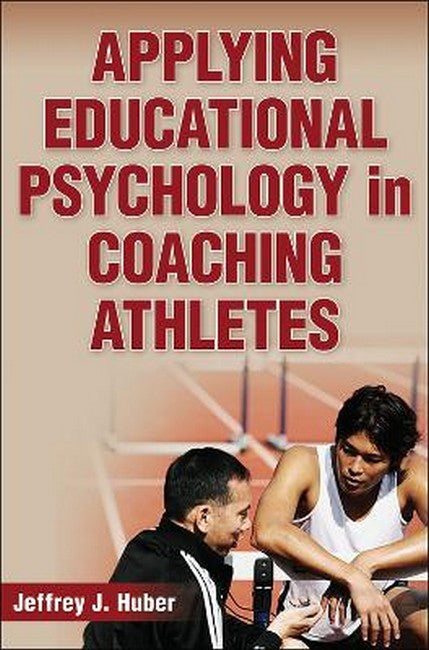Description
Part I. Athletes and Theories of Motivation Chapter 1. The Unstoppable Athlete: Applying Motivation Theory Behaviorism and Motivation Cognitivism and Motivation Social Cognitive Learning and Motivation Humanism and Motivation The Unstoppable Athlete The Unstoppable Coach Your Coaching Toolbox The Scientific and Artful Coach If You Remember Only Three Things Suggested Readings Chapter 2. The Resilient Athlete: Applying Attribution Theory Attribution Theory Beliefs about Ability Perceived Causality and Emotional Response Attributions, Achievement Motivation, and Self-Worth Applying Attribution Theory to Increase Athlete Motivation Self-Determination Theory The Resilient Athlete The Resilient Coach Your Coaching Toolbox The Scientific and Artful Coach If You Remember Only Three Things Suggested Readings Part II. Athletes and Theories of Behaviorism Chapter 3. The Salivating Athlete: Applying Respondent Conditioning Theory Pavlov's Classical (Respondent) Conditioning Positive Respondent Conditioning Examples Applying Respondent Conditioning Theory in Coaching Athletes Thorndike's Connectionism Theory Applying Connectionism Theory in Coaching Athletes Conclusion The Salivating Athlete The Salivating Coach Your Coaching Toolbox The Scientific and Artful Coach If You Remember Only Three Things Suggested Readings Chapter 4. The Athlete in the Skinner Box: Applying Operant Conditioning Theory Skinner's Operant Conditioning Theory Types of Reinforcement Schedules Extrinsic Feedback as Reinforcement Applying Extrinsic Feedback Using Operant Conditioning in Coaching Athletes Instrinsic Feedback as Reinforcement Four Types of Athlete Behavior Worth Conditioning Applying Operant Conditioning Theory in Coaching Athletes The Athlete in the Skinner Box The Coach in the Skinner Box Your Coaching Toolbox The Scientific and Artful Coach If You Remember Only Three Things Suggested Readings Part III. Athletes and Theories of Cognitive Learning Chapter 5. The Imitating Athlete: Applying Social Cognitive Theory Social Cognitive Theory Four Processes of Observational Learning Sources of Reinforcement Effects of Imitation Applying Observational Learning Theory to Coaching Athletes The Imitating Athlete The Imitating Coach Your Coaching Toolbox The Scientific and Artful Coach If You Remember Only Three Things Suggested Readings Chapter 6. The Supercomputing Athlete: Applying Cognitive Learning Theory The Computer as Metaphor Three Memory Components: The Basic Information Processing Model Three Stages of Motor Learning Three Cognitive Motor Learning Theories Three Stages of Information Processing for Motor Performance The Supercomputing Athlete The Supercomputing Coach Your Coaching Toolbox The Scientific and Artful Coach If You Remember Only Three Things Suggested Readings Chapter 7. The Expert Athlete: Applying Expertise Theory and Deliberate Practice Expertise Theory Characteristics of Expertise Characteristics of Deliberate Practice Engaging in Deliberate Practice: Three Phases of Development Creating Deliberate Practice The Expert Athlete The Expert Coach Your Coaching Toolbox The Scientific and Artful Coach If You Remember Only Three Things Suggested Readings Part IV. Athletes and Theories of Humanism Chapter 8. The Fully Human Athlete: Applying Humanistic Learning Theory Humanistic Psychology Applying Four Common Emphases of Humanistic Coaching Nondirective Model of Coaching Constructivism Pyramid of Teaching Success in Sport (PofTSS) The Fully Human Athlete The Fully Human Coach Your Coaching Toolbox The Scientific and Artful Coach If You Remember Only Three Things Suggested Readings Chapter 9. The Emotional Athlete: Applying Emotion Theory Emotions and Performance Arousal, Anxiety, and Performance Consequences of Emotions Applying Emotion Theory in Coaching Athletes The Emotional Athlete The Emotional Coach Your Coaching Toolbox The Scientific and Artful Coach If You Remember Only Three Things Suggested Readings Part V. Developing Your Coaching Skills and Philosophy Chapter 10. The Principled Coach: Applying Principles of Practice Management and Discipline Management and Discipline The Practice Environment Applying Preventive Strategies in Coaching Athletes: Heading Them Off at the Pass Applying Corrective Strategies in Coaching Athletes: When It's Too Late to Head Them Off at the Pass The Bridled Athlete The Principled Coach Your Coaching Toolbox The Scientific and Artful Coach If You Remember Only Three Things Suggested Readings Chapter 11. The Philosophical Coach: Applying Wisdom Considerations for Developing a Coaching Philosophy Developing Ethics Within Your Philosophy Developing Values Within Your Philosophy The Values of Sport The Philosophical Coach The Wise Coach Your Coaching Toolbox The Scientific and Artful Coach If You Remember Only Three Things Suggested Readings
Jeffrey J. Huber, PhD, is head diving coach and an adjunct assistant professor in the department of counseling and educational psychology and the department of kinesiology at Indiana University at Bloomington. As an educational psychologist, Huber has taught courses in educational psychology for both undergraduate and graduate teacher and coach candidates and is a guest lecturer in courses on exercise science, philosophy of coaching, motor learning, and theories of high-level performance. Huber received his doctorate in educational psychology and master's of education in curriculum and instruction from the University of Nebraska at Lincoln. A collegiate coach for over 35 years, Huber has been the recipient of the Big Ten, NCAA, USA, and USOC National Coach of the Year awards. Huber was named the U.S. National Coach of the Year 11 times and has served as U.S. coach for the Sydney (2000), Athens (2004), and Beijing (2008) Olympic Games. In his free time, Huber enjoys running, weightlifting, swimming, and writing. He and his wife, Lesa, reside in Bloomington.

